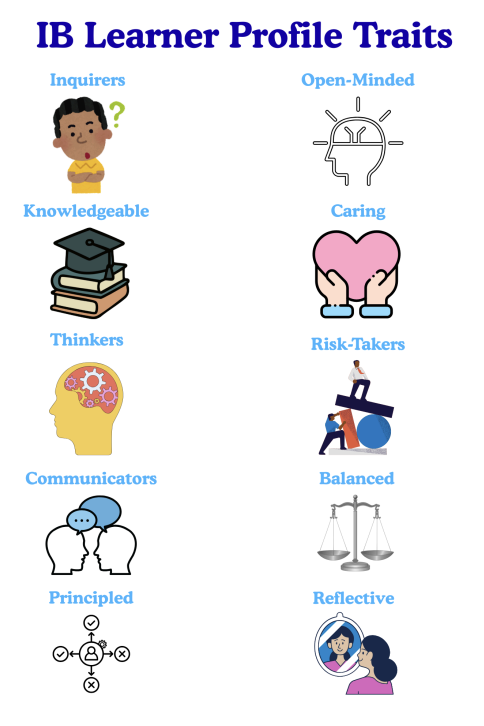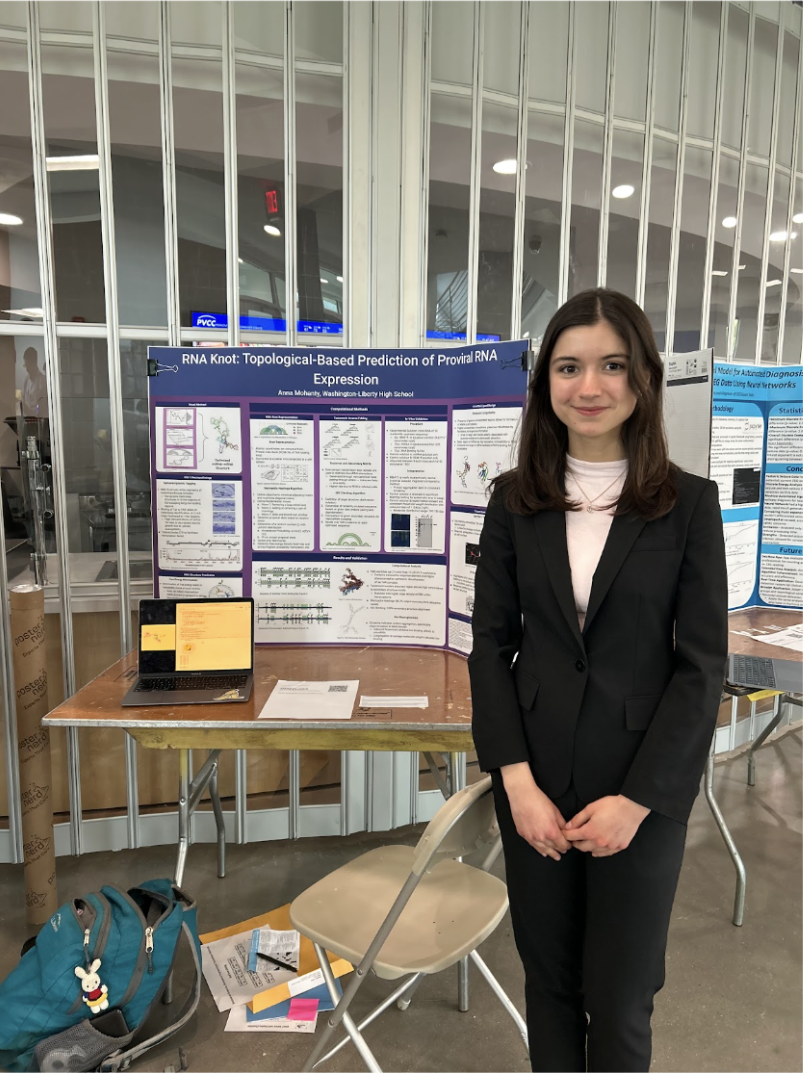The clock is ticking for sophomores to map out their academic future. With IB and AP classes on the table, the challenge is not just choosing the courses; it is choosing the right ones. Both the International Baccalaureate (IB) and Advanced Placement (AP) programs are designed to challenge students, prepare them for college, and set them apart on applications. Each program, however, comes with its own style of learning, workload and benefits. For sophomores preparing to commit to junior and senior year classes, understanding the differences between AP’s subject-specific rigor and IB’s globally minded approach is crucial. This article breaks down the pros and cons of each course to help students make an informed choice about which path best fits their academic goals.
Anna Townsend is a full-IB senior at the school who has taken an array of different IB and AP classes. While in her sophomore year, Townsend decided to go full IB, meaning would be taking entirely IB classes during her junior and senior years of high school. This decision shaped the rest of her high school experience, and current sophomores are now faced with the same decision. Townsend provided advice for sophomores actively making this big decision.
“I definitely think you have to know yourself, and if you have other priorities outside of school that already take up so much time, then IB will not be worth it,” Townsend said. “It’s going to be two things that take up so much of your time on top of each other, but also if you’re already choosing to take so many APs and IBs you might as well do it.”
Townsend took her first AP classes in her sophomore year. She took AP Seminar and AP Human Geography. Her review of the difficulty of these classes provides insight for sophomores considering the full IB program, as well as for 8th graders, freshmen, and juniors who will be filling out their course request forms this spring.
“AP Human Geography is definitely, like, the exam was easy,” Townsend said. “I think that there is a lot of coursework; we had a big workbook that we had to do. I didn’t love it, but I did love AP seminar. It was like a research class, we got to basically research whatever we wanted and write papers on it and do presentations, so I loved that class, and I feel like that was definitely the
most interesting.”
Over the course of her junior and senior years, Townsend has taken a vast array of IB classes, including math and science classes. Townsend’s thoughts on these classes could be particularly beneficial to sophomores who are formulating their IB plan this winter.
“The hardest class, I would say, probably Math Analysis and Approaches IB SL, that was really hard, but I think a close second would definitely be IB Physics, but I thought IB Physics was more interesting, so I enjoyed it more,” said Townsend.
Another full IB senior at the school, Kira Kettler, started taking AP classes in her freshman year. In her freshman year, Kettler took AP World History. In her sophomore year, Kettler took AP Art History and AP Government. Having taken AP classes upon entering high school, Kettler’s review demonstrates how sophomores who took AP World History as freshmen have a leg up going in the IB Program, as it is a very challenging course that, similarly to IB, requires a lot of commitment.
“AP Government was definitely the easiest, especially if you took AP World History; AP Government is kind of like a walk in the park in comparison,” Kettler said. “It definitely depends on the teacher and the vibe of the class, but I thought AP Government was really easy.”
Over her junior and senior years, Kettler has taken a wide variety of IB classes, including math, English, history and anthropology. Seeing as most of these are two-part classes, understanding the translation from taking part one classes in junior year to part two classes in senior year is crucial for sophomores formulating their IB plans. Additionally, all students have to complete an Internal Assessment (IA) for every IB course that they take. These may be a project, essay, lab report or oral presentation, and they typically count 20-30% of the student’s final IB grade.
“Part 2 is going to have a lot more assessment-based work, so you’re working on studying for the exams, but you’re also working on getting papers in [and] that also counts for the exams, those are called IAs,” Kettler said. “You have to write an IA in pretty much every class so you’re doing all of that, which makes it a little bit harder.”
Every IB diploma candidate has to complete a Theory of Knowledge course, which spans over 2 years. This is a philosophy-style course that challenges students to think about how we know what we claim to know. Instead of learning new content, the nature and reliability of knowledge is explored. One of the main differences between someone going full IB and someone going partial IB is that people who go partial IB do not have to take the Theory of Knowledge course. These circumstances could play a large role in whether or not underclassmen decide to go full IB. Kettler, being an IB diploma candidate, is currently taking her second year of this course.
“It’s part of the IB philosophy, so you talk a lot about thinking and learning and that kind of thing,” Kettler said. “It does suck, though, because I’d much rather have that class as time where I can work on stuff for other IB classes.”
Juli Wallet is a partial IB senior at the school. Wallet began taking AP classes in her sophomore year of high school, and throughout her time in high school, she has taken eight AP classes, some of which include AP Psychology, AP Biology and AP Government. Her feedback on these courses offers valuable insights for high schoolers planning their next academic year.
“For the most challenging, I’d probably say AP Biology, it’s a lot of content in a very short amount of time, that’s why it’s put into two periods, because there’s so much that you’re learning, which is hard to get everything in your head properly,” Wallet said. “For the easiest, honestly, all my APs in sophomore year I found pretty easy. I thought the content of government and psychology were really easy to understand, and how my teachers taught it was easy to think about and comprehend.”
Wallet has also taken a variety of IB humanities classes. Having experience with both AP and IB style classes, Wallet’s description of the difference between the two class structures may be beneficial for sophomores deciding whether or not to go full IB.
“For AP’s, it’s really that you’re learning for the exam, so you’re going over very specific things and you need to know specific details” said Wallet “For IB it’s also much more that you want to know the concepts of everything but you’re going to have to think of it on your own, it’s less structured if that makes sense.”
Wallet also explained how personal factors drove her decision to go partial IB rather than full IB. She advises rising juniors who are deciding whether full IB is the right path for them, tying in the personal decisions that led her to make this choice.
“If you’re planning on going full IB, really just think about how much work you want to do outside of school,” said Wallet. “Every single IB course is very rigorous so really think about that, along with [the fact that] the IB program has a lot of other things you have to do outside of classes, so there’s the extended essay, you have CAS, you have all of these other aspects that your also going to have to be doing on top of school.”
Despite taking different academic paths throughout high school, Townsend, Kettler and Wallet all found themselves in challenging but rewarding academic environments. Their advice for rising juniors and their reviews of the AP and IB classes they have taken provide valuable insight for sophomores currently formulating their IB plans.
“I think that one of the best things about IB for me personally is that there’s only about 100-120 kids who do it, so you have the same classes with the same people, and I think it’s just kind of cool to go through that with a bunch of other people,” Kettler said. “You’re all kind of in the same boat, you’re all trying to get into the same schools and you’re trying to have the same goals out of high school, so I think that the best part of IB is the community.”








